虚拟语气语法讲座
- 格式:doc
- 大小:39.00 KB
- 文档页数:5
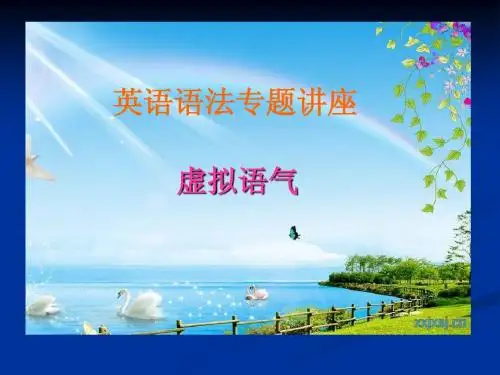

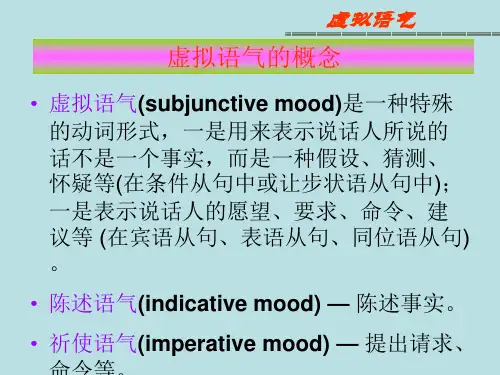
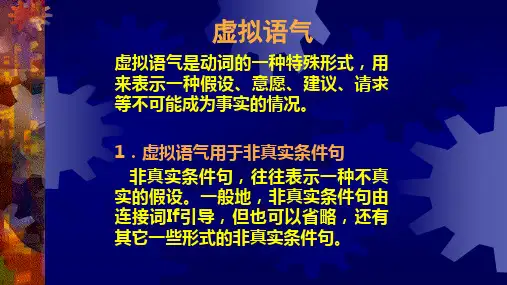

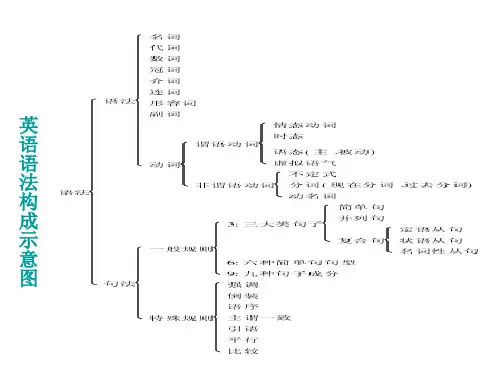
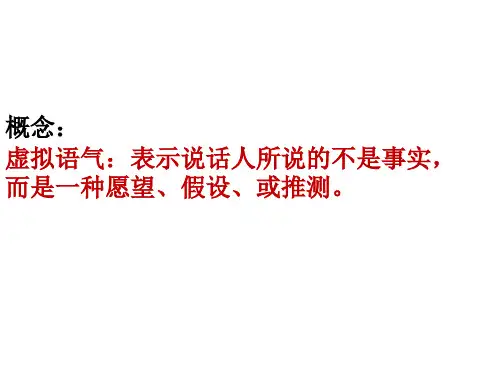

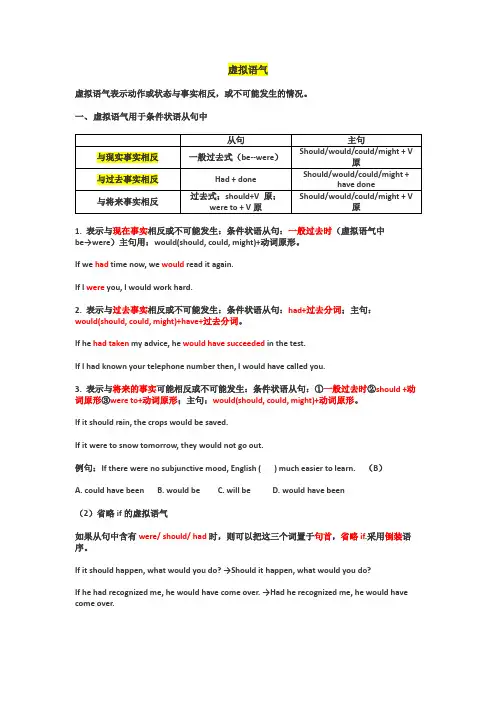
虚拟语气虚拟语气表示动作或状态与事实相反,或不可能发生的情况。
一、虚拟语气用于条件状语从句中从句主句与现实事实相反一般过去式(be--were)Should/would/could/might + V原与过去事实相反Had + done Should/would/could/might +have done与将来事实相反过去式;should+V 原;were to + V原Should/would/could/might + V原1. 表示与现在事实相反或不可能发生:条件状语从句:一般过去时(虚拟语气中be→were)主句用:would(should, could, might)+动词原形。
If we had time now, we would read it again.If I were you, I would work hard.2. 表示与过去事实相反或不可能发生:条件状语从句:had+过去分词;主句:would(should, could, might)+have+过去分词。
If he had taken my advice, he would have succeeded in the test.If I had known your telephone number then, I would have called you.3. 表示与将来的事实可能相反或不可能发生:条件状语从句:①一般过去时②should +动词原形③were to+动词原形;主句:would(should, could, might)+动词原形。
If it should rain, the crops would be saved.If it were to snow tomorrow, they would not go out.例句:If there were no subjunctive mood, English ( ) much easier to learn. (B)A. could have beenB. would beC. will beD. would have been(2)省略if的虚拟语气如果从句中含有were/ should/ had时,则可以把这三个词置于句首,省略if.采用倒装语序。


虚拟语气一.虚拟语气在虚拟条件句中的应用。
虚拟条件是相对于真实条件而言的。
如果假设的条件有可能发生或发生的可能性很大,就用真实条件句;反之,则用虚拟条件句。
如:If you don’t mind, I’ll turn on the radio. (I’m going to turn on the radio, if you ag ree.)真实条件句If I were you, I would do it some other way. (I’m not you, so I can’t do it some other w ay.)虚拟条件句。
1.虚拟从句与主句的谓语构成。
(1). 一般时态下的虚拟语气句子的谓语构成;从句谓语:系动词be一律用were;行为动词一律用过去式主句谓语:would; could; might; should + 动词原形If I knew the truth, I would tell you.If I were you, I would receive his invitation.If there were no gravity, we should not be able to walk.(2). 与过去事实相反的假设从句谓语:had +过去分词主句谓语:should; would; might; would + have +过去分词If I had known that you were coming, I would have met you at the airport.If I had more time, I would have finished my work.You could have done better if you had been more careful.(3). 与未来事实相反的假设从句谓语:should; were to +动词原形主句谓语:should; would; might; could +动词原形If you should fail, what would you do?If you should encounter with any inconvenience, please don’t hesitate to let us know.If you were to try again, you might succeed.If the cover should have a crack in it, the harmful gas would come out and cause pollution. 注:1. 主句中第一人称用should,也可以用would,第二、第三人称只用would。
英语的虚拟语气知识点讲解一、虚拟语气的概念。
虚拟语气是一种特殊的动词形式,表示所说的话不是事实,而是一种假设、愿望、怀疑、推测或与事实相反的情况等。
二、虚拟语气在非真实条件句中的用法。
1. 与现在事实相反。
- 条件从句的谓语动词用一般过去式(be动词一般用were),主句的谓语动词用“should/would/could/might + 动词原形”。
- 例如:If I were you, I would take an umbrella.(实际上我不是你)2. 与过去事实相反。
- 条件从句的谓语动词用“had + 过去分词”,主句的谓语动词用“should/would/could/might+have +过去分词”。
- 例如:If he had taken my advice, he would have passed the exam.(实际上他没听我的建议,也没通过考试)3. 与将来事实相反。
- 条件从句的谓语动词有三种形式:一般过去式、“should+动词原形”、“were to+动词原形”,主句的谓语动词用“should/would/could/might +动词原形”。
- 例如:If it rained/were to rain/should rain tomorrow, we would not go out.三、虚拟语气在宾语从句中的用法。
1. wish后的宾语从句。
- 表示与现在事实相反的愿望,从句谓语动词用一般过去式(be动词用were)。
例如:I wish I were a bird.(实际上我不是鸟)- 表示与过去事实相反的愿望,从句谓语动词用“had+过去分词”。
例如:Iwish I had seen the film yesterday.(实际上昨天没看这部电影)- 表示与将来事实相反的愿望,从句谓语动词用“would/could/might+动词原形”。
例如:I wish I could fly to the moon tomorrow.2. 在表示建议、要求、命令等意义的动词后的宾语从句中(如suggest, advise, demand, require, order等)- 从句谓语动词用“should+动词原形”,should可以省略。
最经典最清晰虚拟语气讲解虚拟语气定义:虚拟语气用来表示说话人的主观愿望或假想,不是事实或与事实相反。
陈述语气祈使语气动词的语气非真实条件句中的虚拟语气名词性从句中的虚拟语气虚拟语气特殊句型中的虚拟语气虚拟语气需特别注意的情况用法:一.IF引导的虚拟句式注意;混合虚拟(1)不同时间的虚拟:If he had listened to me, he would not be in trouble now.If he had told me yesterday, I should know what to do now.(2) 虚拟与陈述的混合:He could have passed the exam, but he wasn’t careful enough. You should have come earlier, the bus left a moment ago.二.名词性从句中的虚拟语气:从句谓语动词(should) +do1.主语从句:it is + adj + that结构2.宾语从句:主语+要求接虚拟语气的动词+that一个坚持:insist两个命令:order; command 两个决定:decide; determine三个建议:suggest; advise; propose四个要求:demand; ask; request; require注意:① suggest:暗示;insist:坚持说(不虚拟)② except, believe, think suspect等动词的否定形式或疑问句后面的宾语从句要用虚拟。
I never thought that he should be such a brave young solider③ should竟然I am glad that your novel should have won the first prize.④ wish引导从句的虚拟语气,谓语动词变化和if从句虚拟语气一样。
具体讲解内容:今天这节课我们主要对虚拟语气在条件句中的应用进行讲解。
同学们我们知道,英语中的语气有三类:陈述语气、祈使语气和虚拟语气。
其中虚拟语气主要用来表示说话人的主观愿望或假想,而与客观存在的事实相反的或难以实现的情况。
这里我们主要探讨一下虚拟语气在非真实条件状语从句中的基本用法。
非真实条件句是表示假设或实际可能性不大的情况,因而用虚拟语气。
一般分为三类:与现在事实相反、与过去事实相反及与将来事实相反。
这三个类型分别有三种固定结构组成。
我们来一一讲解。
首先,与现在事实相反的虚拟语气,它的常用结构是if从句谓语用一般过去式(be动词一般用were),而主句谓语用“would/should/could/might+动词原形”。
(同时在板书if……+did(were)+……,……+would/should/could/might+do+……)。
配合这个格式我们先来造个例句。
大家知道前段时间朝鲜用了数十年时间整出一运载火箭“罗老号”,飞了两分钟就掉下来了。
合着拿四亿美金的研究经费放了一窜天猴玩儿。
那么我们来假设如果我是金正恩总书记,我会把钱用来改善民生而不是放烟火玩儿。
if I were General secretary Kim Jong-un, I would spend the money improving people’s livelihood instead of playing firework.大家知道,现在我并不是金同志,由此可见,这里的I were表示的是与现在事实相反的情况,所以后面主句中谓语用would spend,would+动词原形。
接下来我们看到与过去事实相反的虚拟语气,它的常用结构是if从句谓语用had+过去分词,主句谓语为would/should/could/might+have+过去分词。
(同时板书if……+had done+……,…+would/should/could/might+havedone+……)。
虚拟语气一.虚拟语气在虚拟条件句中的应用。
虚拟条件是相对于真实条件而言的。
如果假设的条件有可能发生或发生的可能性很大,就用真实条件句;反之,则用虚拟条件句。
如:If you don’t mind, I’ll turn on the radio. (I’m going to turn on the radio, if you ag ree.)真实条件句If I were you, I would do it some other way. (I’m not you, so I can’t do it some other w ay.)虚拟条件句。
1.虚拟从句与主句的谓语构成。
(1). 一般时态下的虚拟语气句子的谓语构成;从句谓语:系动词be一律用were;行为动词一律用过去式主句谓语:would; could; might; should + 动词原形If I knew the truth, I would tell you.If I were you, I would receive his invitation.If there were no gravity, we should not be able to walk.(2). 与过去事实相反的假设从句谓语:had +过去分词主句谓语:should; would; might; would + have +过去分词If I had known that you were coming, I would have met you at the airport.If I had more time, I would have finished my work.You could have done better if you had been more careful.(3). 与未来事实相反的假设从句谓语:should; were to +动词原形主句谓语:should; would; might; could +动词原形If you should fail, what would you do?If you should encounter with any inconvenience, please don’t hesitate to let us know.If you were to try again, you might succeed.If the cover should have a crack in it, the harmful gas would come out and cause pollution. 注:1. 主句中第一人称用should,也可以用would,第二、第三人称只用would。
要表达“能够”情态意义时,主句中要用could;要表达“可能”情态意义时,主句要用might。
2. If引导的含有were, should, had 的从句, if若省略,从句中的were, should, had前置,构成部分倒装,但部分谓语提前的话,否定词不能提前。
Ex. Had it not been for the reservoir we’d never been able to beat the drought.Had she been given some hints, she could have answered the questions.2. 错综时间虚拟条件句主句与从句所指的时间不一致,例如从句是过去的假设,而主句是现在的结果,或者相反,等等,这时就要按照各自表示的时间来调整动词的形式。
如:1. If I had a bike, I would have lent it to you yesterday.2. If the weather had been more favorable, the crops would be growing still better.3. If he had followed the doctor’s advice, he would be quite all right now.3.含蓄虚拟条件句有时句中并未出现引导的条件句从句,其假设情况是用以下的几种情况来表示或暗示的。
(1). 介词短语Ex. I could not have fulfilled the task without your help.But for air and water, nothing could live.In different circumstances, I would have said yes.He can use the bicycle on condition that he return it tomorrow.(2). 某些连词( otherwise, but, supposing, provided, providing, unless, on condition that 等) Ex. She had intellect. Otherwise I would have scorned her. ( If she hadn’t intellec t…..)I would gladly lend you the money but I really don't have it. ( If I had money, …..)Supposing this ferry were to sink, what would we do?Provided the circumstances permit, I would climb the mountain.(3). 通过上下文Ex. It would be a mistake to stand by. ( It would be a mistake if we stood by.)Such an accident could have been avoided. (if we had been more careful.)It was so quiet, you could have heard a pin drop (if you had listened carefully.) 二.虚拟语气在状语从句中的应用1. 在as if , as though引导的方式状语从句中。
在此类从句中,虚拟语气究竟采用何种形式,取决于从句中所明确表示或暗示出的时间,而与主句谓语动词的时态无关。
如果主从句谓语动词的动作同时发生,从句谓语动词就用过去式(be一律用were);如果主句谓语动词的动作发生或正在发生时,从句谓语的动作正在进行,从句谓语动词就用过去进行式(be一律用were);如果从句谓语动词的动作发生在主句谓语动词的动作之前,从句谓语动词就用过去完成式。
Ex. He talks / talked as if he knew everything.The wind is / was blowing so hard as though it were going to destroy the world.That tree looked as if it hadn’t been watered for a long time.2. 虚拟语气用于lest, for fear that 和in case引导的目的状语从句中在此类从句中,谓语多用动词原形或should加动词原形。
Ex. The driver looked over the engine carefully lest it should go wrong on the way.He handled the instrument with care for fear that it should be damaged.Ted doesn't dare to go out of the house in case he should be recognized.3. 虚拟语气用于so that和in order that引导的目的状语从句中。
在此类从句中,谓语多用may或mig ht ,can或could加动词原形,否定式则多用should not加动词原形。
Ex. Speak clearly, so that they may (can) understand you.I took my golf clubs so that I could play at the weekend.The teacher spoke slowly in order that all the students might ( could ) hear him clearly. He came in quietly in order that he shouldn't wake his wife.Let’s prepare a word list so that no one should have any difficulty in reading it.三.虚拟语气在宾语从句中的应用(1). “had hoped”这种句型表示一种“过去未实现的愿望”,从句谓语要用谓语“would +动词原形”Eg. I had hoped that Jane would become a doctor, but she wasn’t good enough at science.We had hoped that she would change her mind.We had hoped that State University would win the basketball game, but the other team play ed very well.(2). 虚拟语气用would后的宾语从句中。
Would (或‘d)是有实在意义的及物动词,是表示愿望(desire或wish)的一种特殊用法,其后常跟rather, sooner, (just) as soon含有“宁愿”“但愿”的意思,在句中作状语,用来修饰它。
would要求它的宾语从句用一般过去式,be一律用were.Ex. I would (that ) I were young again. I would (that)= (I wish )I would rather they came tomorrow.I could go myself, but I would sooner you went.I’d just as soon you didn’t take those important papers with you.注:* Would rather和 had rather都可以采用“’d rather”省略形式,后面通常使用省去that 的从句,从句中的谓语要用过去时。